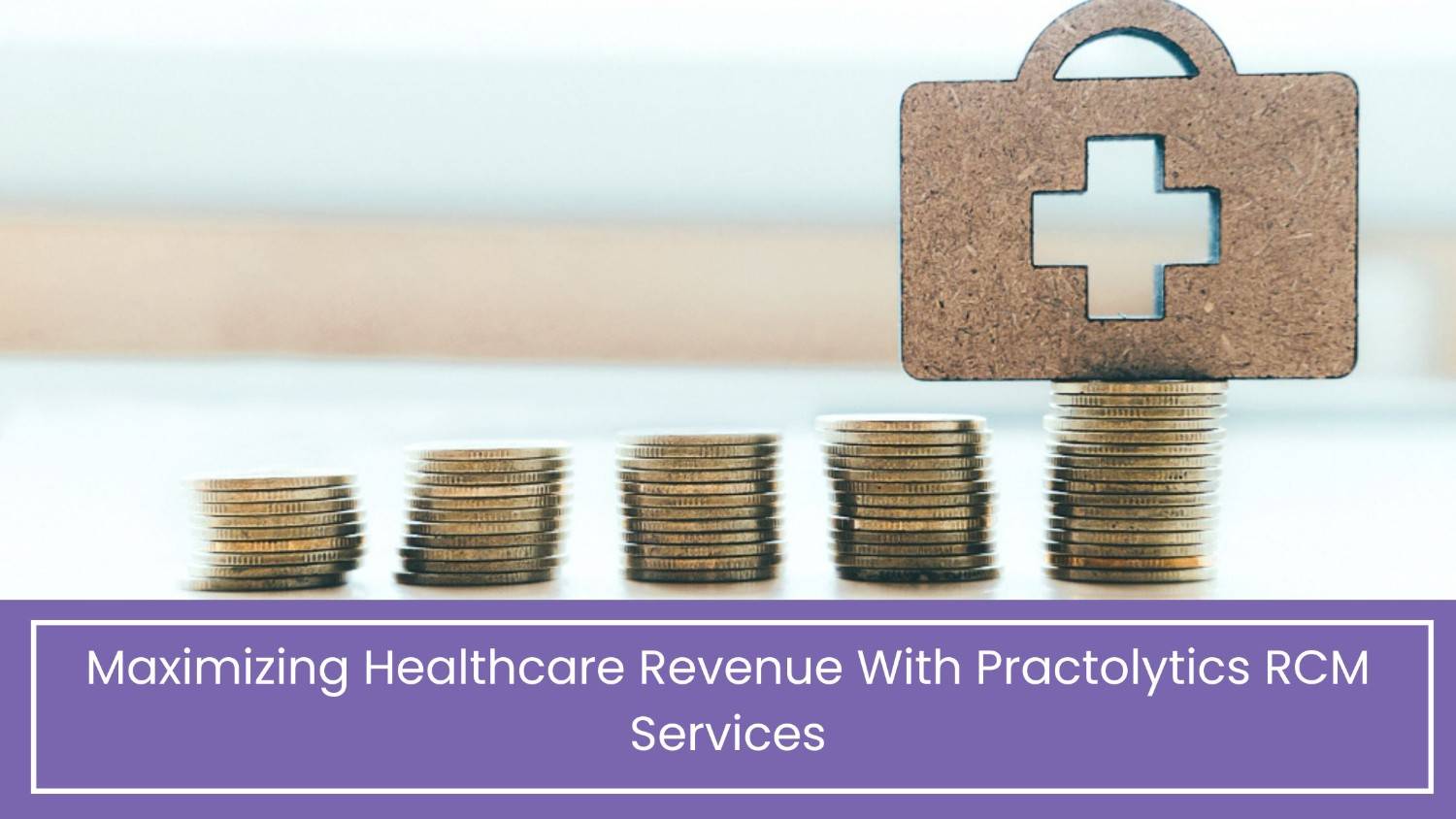Maximizing Healthcare Revenue With Practolytics RCM Services
In the intricate world of modern healthcare, managing a healthcare facility extends beyond providing exceptional patient care. Healthcare providers must skillfully navigate a complex financial landscape to ensure timely and accurate reimbursement for their services. This is where Revenue Cycle Management (RCM) becomes essential. Maximizing healthcare revenue with Practolytics RCM services enables providers to streamline operations, improve financial performance, and focus more on patient care. In this comprehensive blog, we will delve into the core principles of RCM, outline the complete process healthcare providers should understand, and explore the benefits of outsourcing this crucial function to a trusted partner like Practolytics.
Table of Contents
What does Revenue Cycle Management (RCM) entail?
Revenue Cycle Management (RCM) in the healthcare industry involves the methodical management of an organization’s financial aspects, spanning from the initial patient interaction to the receipt of the final payment for treatment. It encompasses the entirety of a patient’s journey, commencing from the moment they seek medical care to the ultimate reimbursement acquired from either insurance companies or the patients themselves. RCM is designed to optimize a healthcare facility’s revenue by streamlining the billing and reimbursement procedures, reducing errors, and enhancing the flow of funds.
The benefits of RCM in healthcare are significant. First and foremost, it fosters financial stability for healthcare organizations by refining the billing and payment processes, diminishing claim rejections, and expediting the inflow of funds. This enables providers to reinvest in patient care, enhance infrastructure, and expand their services. Moreover, RCM ensures adherence to the constantly evolving healthcare regulations, mitigating the risk of audits and penalties. Additionally, it elevates patient satisfaction levels by offering transparent billing processes and addressing billing inquiries promptly. Revenue Cycle Management in healthcare not only fortifies the financial well-being but also contributes to the overall welfare of healthcare providers and their patients.
The practice of managing the Revenue Cycle
- Patient Enrollment: The initiation of the RCM process commences with patient enrollment. This phase involves the capture of vital demographic and insurance details, encompassing names, contact information, insurance policy specifics, and medical histories. The precision and currency of this patient data are of utmost importance to ensure the accurate processing of claims.
- Insurance Eligibility Verification: Prior to delivering medical services, healthcare professionals are obligated to confirm the insurance eligibility of the patient. This verification process includes ascertaining the status of the patient’s insurance coverage, the nature of coverage, and any pre-authorization prerequisites. Validating eligibility serves to prevent claim rejections due to insufficient insurance coverage.
- Appointment Scheduling: Effective scheduling of patient appointments assumes a pivotal role in optimizing the revenue cycle of a healthcare facility. Inadequate or excessive booking can lead to missed revenue opportunities. Automated scheduling systems can prove instrumental in efficiently managing appointment slots.
- Point of Care: During the patient’s visit, healthcare providers document the services dispensed, diagnoses, and treatment plans. This documentation stands as a critical component for precise billing and claims processing. Electronic Health Records (EHR) systems play a substantial role in this step, ensuring secure storage and easy accessibility of patient data.
- Coding and Charge Capture: The involvement of medical coders becomes imperative as they convert treatment services into standardized medical codes. Ensuring the accuracy of coding is essential to guarantee that claims receive reimbursement at the appropriate level. Coding inaccuracies may result in claim denials or underpayments.
- Claims Submission: Once services are encoded, claims are generated and forwarded to insurance providers or government payers. This step encompasses the electronic transmission of claims, attachment of all necessary documentation, and adherence to the specific billing guidelines stipulated by payers.
- Claims Adjudication: Submitted claims undergo review and processing by insurance companies. This process can encompass the validation of provided information, assessment of patient eligibility, and determination of the reimbursement amount. The adjudication process may lead to claim approval, denial, or requests for additional information.
- Payment Posting: Following claims adjudication, healthcare providers receive payments from insurance companies or patients. Payment posting entails the accurate recording of these payments in the financial system, the updating of patient accounts, and the reconciliation of payments with claims.
- Denial Management: Claim denials are a commonplace occurrence in healthcare billing. The management of denials involves the identification of reasons for claim denials, correction of errors, and resubmission of claims for reimbursement. This process aims to minimize revenue leakage and maximize reimbursement.
- Patient Billing and Collections: Patients bear responsibility for a portion of their medical expenses, such as copayments, deductibles, and coinsurance. Healthcare providers must issue clear and accurate bills to patients and pursue outstanding balances diligently. Effective patient billing and collections are imperative for sustaining cash flow.
- Reporting and Analysis: Consistent reporting and analysis of revenue cycle performance aid healthcare providers in pinpointing areas requiring enhancement. Metrics like Days in Accounts Receivable (AR), rejection rates, and collection rates offer insights into the financial health of the facility.
Engaging in Revenue Cycle Management through Outsourcing
Managing the revenue cycle in healthcare can present intricate challenges and consume substantial time. Healthcare providers frequently grapple with issues such as shifting regulations, evolving payer policies, and the demand for specialized billing expertise. Consequently, many healthcare institutions contemplate the option of outsourcing their Revenue Cycle Management (RCM) functions to third-party service providers. Here are some key rationales that underscore the viability of outsourcing RCM:
- Expertise and Specialization: RCM outsourcing entities are dedicated to revenue cycle management, boasting teams of experts well-versed in medical billing and coding, payer regulations, and industry best practices. This specialized knowledge translates to heightened accuracy and efficiency in claims processing.
- Cost Reduction: Outsourcing RCM can translate into significant cost savings for healthcare practitioners. By eliminating the necessity of recruiting and training in-house billing staff, healthcare organizations can curtail labour costs, administrative expenses, and investments in IT infrastructure.
- Focus on Core Competencies: Delegating RCM responsibilities to external providers allows healthcare practitioners to redirect their focus and resources toward providing top-quality patient care. This empowers healthcare professionals to concentrate on clinical activities, enhance patient outcomes, and elevate the overall patient experience.
- Scalability: Outsourcing RCM allows healthcare facilities to scale their revenue management processes according to their requirements. This adaptability proves especially valuable for practices dealing with fluctuations in patient volume.
- Reduced Administrative Burden: Managing revenue cycle responsibilities can be labour-intensive and administratively taxing. Outsourcing liberates staff members and medical professionals from the administrative aspects of billing and collections, enabling them to focus on their core duties.
- Compliance and Regulation Adherence: RCM outsourcing firms stay current with the latest healthcare regulations and payer policies, facilitating healthcare providers in meeting legal requirements and mitigating the risk of audits and penalties.
- Enhanced Technology: RCM outsourcing companies often possess advanced billing and practice management software, capable of streamlining processes and enhancing efficiency. This technology, which can be financially burdensome for individual healthcare facilities to implement and maintain, is made accessible through outsourcing.
- Improved Cash Flow: The punctual and accurate processing of claims by RCM outsourcing firms can lead to expedited reimbursement, thereby diminishing accounts receivable and enhancing cash flow for healthcare providers.
Conclusion
Revenue Cycle Management (RCM) is essential in modern healthcare, and Practolytics specializes in streamlining this process. From patient enrollment to payment posting, RCM optimizes billing, reduces errors, and enhances financial stability. Healthcare providers can benefit from outsourcing RCM to Practolytics for expertise, cost reduction, improved focus on patient care, scalability, compliance, advanced technology, and better cash flow. Practolytics is your trusted partner in navigating the complexities of RCM.
Why delay? Unlock your revenue potential with Practolytics’ RCM services today!
ALSO READ – The Importance of Patient Scheduling and 6 Best Practices
Talk to Medical Billing Expert Today — Get a Free Demo Now!






